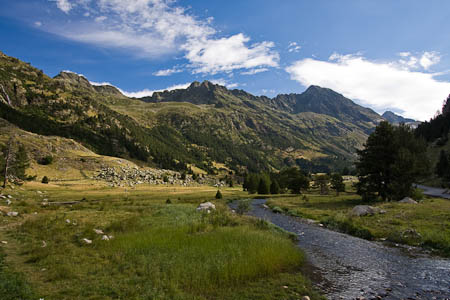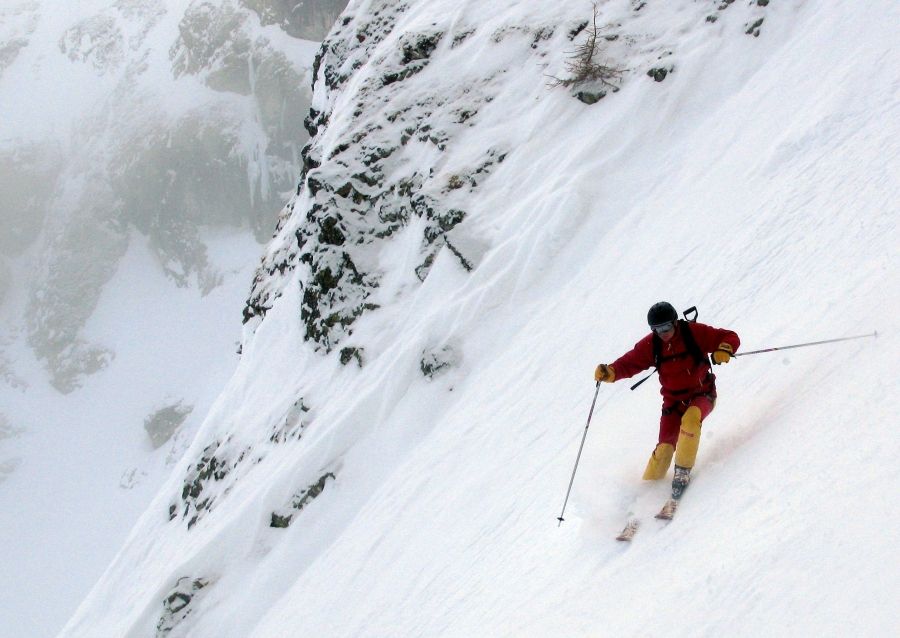Written by Matt Dickinson
18th August 2017
Steep skiing is certainly an exciting passion and very satisfying, but often can seem a little intimidating find out how to tame higher gradients with Matt, one of our Lead Guides.
The ability to tackle steeps opens up new possibilities on skis and allows greater access to challenging locations - and the ever-present knowledge that one shouldn't fall means that the adrenaline flows freely! Generally, off-piste skiers need to have a good portfolio of techniques so that they can adapt to ever-changing snow conditions and slope angles. To ski steep slopes in control requires a different set of skills than with gentler gradients, and these techniques are very different to those of modern piste skiing.
The steepness of a slope is quoted in degrees and defined as the change in elevation divided by measured distance horizontally. A slope between 30° and 40° can be defined as 'steep'. Slopes above 40° are termed 'very steep'. The term ‘extreme’ is both overused and misused. An 'extreme' slope is best defined as one which is over 40° for a considerable distance and has serious consequences if the skier falls. This article refers to steep ground but doesn’t attempt to look at extreme ski techniques - that’s a different game entirely and genuinely another level altogether.
If you are interested in steep skiing there are some important prerequisites. Firstly, you should already be an experienced off-piste skier familiar with all snow types; you should be able to read the conditions and make accurate judgements regarding the snow texture and be able to continuously adjust your balance accordingly. Remember, when skiing off-piste we always ski in control and can stop when and where we like. If you are out of control or desperately trying to slow down on your turn exits, then the terrain is too difficult for you. Steep skiing is a serious exercise, so great care is needed.
A great deal is in the head. The first turn can be a mental challenge, especially if there is significant exposure. The key is to relax, concentrate on your stance... and just do it! If the first few turns go well, then it usually gets continually easier as the mind settles down and the enjoyment kicks in.
Completing a steep skiing course with Mountain Tracks in either Chamonix or La Grave is the perfect way to progress your steep skiing, find out more about these clinics here.
STANCE
Okay. Now down to the details: your stance should be stable with your weight slightly forward. You must keep your stance discipline on the steeps; if you have a tendency to lean back then your turn radius will increase dramatically together with your speed. To have a confident stance, position your skis across the hill, the upper body (including your head!) should be facing downhill. It is important not to let the slope angle or exposure intimidate you, this leads to a defensive technique which doesn’t work. Some people lean back to feel closer to the hill behind them; this will put your weight back. Remember you must have a confident and disciplined stance to ski effectively.
POLES
The poles are essential tools on the steeps; pole planting (early in the turn) should be practised whenever possible. Pole plants have to be strong and decisive. As we move forward into the first turn we quickly reach down the slope with the pole, plant it firmly, and then begin to press from the shoulder. This action serves two purposes, firstly it provides a pivot point for the turn and secondly the pressing action takes the weight off the skis, which enable us to ‘extend’ and bring the skis around quickly (again if this is done incorrectly then, excessive speed results). A common error is pole planting too late in the turn. The quicker you can plant the pole the more useful it becomes. Leave the pole in place until your momentum naturally lifts it from the snow.
MOVEMENT
Turns on the steeps are of a short radius: the time it takes to make each turn is the key. We don’t want the skis pointing down the hill for long, because that’s where the real acceleration occurs. The poles are critical, a decisive pole plant unweights the skier and enables the skis to be lifted out of the snow (particularly important in powder) and brought around the turn. Once the first turn has been initiated momentum slows (or the skier may want to stop completely), and the skis are once again across the hill. The second turn can then be initiated. As the turns progress, keep the pressure on both your skis and don’t allow your legs to spread too far.
As with linked powder turns, well-executed extensions and compressions (or weighting and unweighting) on steeps leads to a rhythmic motion that is very satisfying when mastered.
HOP TURN
Especially in deep snow, this is a valuable technique. The hop turn as the name suggests uses a strong upward movement to force the skis out of the snow, resulting in the opportunity to make a much quicker turn. Hop turns do require the simultaneous turning movements of both legs and both feet to change the direction of the skis. The hop turn should be timed perfectly with a strong pole plant, the weighting of the pole is used to initiate the hop. Hop off the snow by extending the ankles and knees explosively, leaving the pole on the snow. Twist the feet and legs while the skis are un-weighted, pivoting the skis around the axis of the boots. Absorb the landing by bending your knees. A double pole plant can be useful to initiate a hop turn but is not essential, try experimenting with the double plant, it’s a fun technique. The hop turn should be practised whenever possible and on gradually steeper slopes.
SIDE SLIP
All skiers will need to play a 'get out of jail card' at some point. This usually means side slipping. If the slope is too steep for you to make a confident turn, then a side slip gets you down safely. The method is relatively simple, it simply takes practice and good balance to side slip properly. Remember fight your fear, because the most stable position is to stand up vertically not to lean into the slope, leaning into the slope decreases your edge grip, whatever your instincts tell you.
Stand across the fall line, and roll your ankle downhill, thus decreasing the skis edge grip. When you are ready to slow down or stop, simply roll your ankles back up to re-establish edge grip. Poles are used for balance. It is possible to side slip on remarkably steep and icy ground....but you MUST hold your nerve!
Mountain Tracks offer advanced ski courses throughout the season, which all include elements of steep skiing. In addition, we offer specialist clinics in Chamonix and La Grave, both of which are meccas for steep skiing.
 Off-Piste
Off-Piste Ski Touring
Ski Touring Via Ferrata
Via Ferrata Ice Climbing
Ice Climbing Alpine Glacier Trekking
Alpine Glacier Trekking Worldwide Trekking
Worldwide Trekking




 Travel Website Development
Travel Website Development